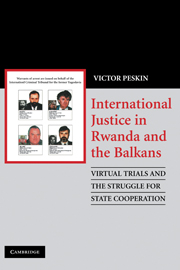 International Justice in Rwanda and the Balkans
International Justice in Rwanda and the Balkans Book contents
- Frontmatter
- Contents
- Maps and Timelines
- Acknowledgments
- Permissions
- Note on Pronunciation
- MAP 1 Map of the Former Yugoslavia
- MAP 2 Map of Rwanda
- PART I INTRODUCTION
- 1 International War Crimes Tribunals and the Politics of State Cooperation
- PART II THE BALKANS: STRATEGIES OF NON-COMPLIANCE AND INSTRUMENTS OF PRESSURE
- PART III RWANDA: VIRTUAL TRIALS, INTERNATIONAL JUSTICE, AND THE POLITICS OF SHAME
- PART IV CONCLUSION
- Bibliography
- Index
1 - International War Crimes Tribunals and the Politics of State Cooperation
Published online by Cambridge University Press: 05 September 2012
- Frontmatter
- Contents
- Maps and Timelines
- Acknowledgments
- Permissions
- Note on Pronunciation
- MAP 1 Map of the Former Yugoslavia
- MAP 2 Map of Rwanda
- PART I INTRODUCTION
- 1 International War Crimes Tribunals and the Politics of State Cooperation
- PART II THE BALKANS: STRATEGIES OF NON-COMPLIANCE AND INSTRUMENTS OF PRESSURE
- PART III RWANDA: VIRTUAL TRIALS, INTERNATIONAL JUSTICE, AND THE POLITICS OF SHAME
- PART IV CONCLUSION
- Bibliography
- Index
Summary
Prologue: Survivors and Suspects
On the morning of Friday, June 7, 2002, security officers working for the United Nations war crimes tribunal in Rwanda gathered several survivors of the 1994 genocide and brought them quietly to the airport on the outskirts of the capital, Kigali. The group of survivors – mostly poor Tutsi peasants – was set to board a UN plane for the two-hour flight that crosses the vast expanse of Lake Victoria en route to the tribunal's courtrooms in Arusha, Tanzania. The survivors had been chosen to testify for the prosecution in two trials of Hutu genocide suspects at the international court.
Moving witnesses from the green hills of Rwanda to the windowless courtrooms in Arusha some 400 miles to the east had become routine in the six and a half years since trials first began at the UN war crimes tribunal. But as the events of that day and the next few months would illustrate, the tribunal's existence depended on carrying out the seldom-noticed task of taking witnesses out of the country and, most importantly, on the willingness of the Rwandan government to permit it to do so.
When the tribunal's security officers escorted the survivors to the airport, the officers were stunned to learn that the Tutsi-led Rwandan government had just instituted travel restrictions that blocked the Tutsi prosecution witnesses from traveling to Arusha to testify against Hutu suspects on trial for genocide.
- Type
- Chapter
- Information
- International Justice in Rwanda and the BalkansVirtual Trials and the Struggle for State Cooperation, pp. 3 - 26Publisher: Cambridge University PressPrint publication year: 2008


